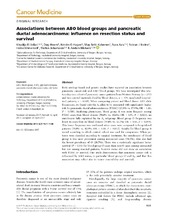| dc.contributor.author | el Jellas, Khadija | en_US |
| dc.contributor.author | Hoem, Dag | en_US |
| dc.contributor.author | Hagen, Kristin Gjerde | en_US |
| dc.contributor.author | Kalvenes, May Britt | en_US |
| dc.contributor.author | Aziz, Sura Mohammed | en_US |
| dc.contributor.author | Steine, Solrun | en_US |
| dc.contributor.author | Immervoll, Heike | en_US |
| dc.contributor.author | Johansson, Stefan | en_US |
| dc.contributor.author | Molven, Anders | en_US |
| dc.date.accessioned | 2018-09-05T09:12:27Z | |
| dc.date.available | 2018-09-05T09:12:27Z | |
| dc.date.issued | 2017-07 | |
| dc.Published | el Jellas KE, Hoem D, Hagen KG, Kalvenes MB, Aziz S, Steine S, Immervoll HI, Johansson S, Molven A. Associations between ABO blood groups and pancreatic ductal adenocarcinoma: influence on resection status and survival. Cancer Medicine. 2017;6(7):1531-1540 | eng |
| dc.identifier.issn | 2045-7634 | |
| dc.identifier.uri | https://hdl.handle.net/1956/18389 | |
| dc.description.abstract | Both serology‐based and genetic studies have reported an association between pancreatic cancer risk and ABO blood groups. We have investigated this relationship in a cohort of pancreatic cancer patients from Western Norway (n = 237) and two control materials (healthy blood donors, n = 379; unselected hospitalized patients, n = 6149). When comparing patient and blood donor ABO allele frequencies, we found only the A1 allele to be associated with significantly higher risk for pancreatic ductal adenocarcinoma (PDAC) (23.8% vs. 17.9%; OR = 1.43, P = 0.018). Analyzing phenotypes, blood group A was more frequent among PDAC cases than blood donors (50.8% vs. 40.6%; OR = 1.51, P = 0.021), an enrichment fully explained by the A1 subgroup. Blood group O frequency was lower in cases than in blood donors (33.8% vs. 42.7%; OR = 0.69, P = 0.039). This lower frequency was confirmed when cases were compared to hospitalized patients (33.8% vs. 42.9%; OR = 0.68, P = 0.012). Results for blood group B varied according to which control cohort was used for comparison. When patients were classified according to surgical treatment, the enrichment of blood group A was most prominent among unresected cases (54.0%), who also had the lowest prevalence of O (28.7%). There was a statistically significant better survival (P = 0.04) for blood group O cases than non‐O cases among unresected but not among resected patients. Secretor status did not show an association with PDAC or survival. Our study demonstrates that pancreatic cancer risk is influenced by ABO status, in particular blood groups O and A1, and that this association may reflect also in tumor resectability and survival. | en_US |
| dc.language.iso | eng | eng |
| dc.publisher | Wiley | eng |
| dc.relation.ispartof | <a href="http://hdl.handle.net/1956/19133" target="blank"> Carboxyl-ester lipase in human pancreatic disease. A study with focus on genetics, glycosylation and ABO blood groups</a> | |
| dc.rights | Attribution CC BY | eng |
| dc.rights.uri | http://creativecommons.org/licenses/by/4.0/ | eng |
| dc.subject | ABO | eng |
| dc.subject | blood group | eng |
| dc.subject | FUT2 | eng |
| dc.subject | glycosyltransferase | eng |
| dc.subject | pancreatic ductal adenocarcinoma | eng |
| dc.subject | risk factor | eng |
| dc.title | Associations between ABO blood groups and pancreatic ductal adenocarcinoma: influence on resection status and survival | en_US |
| dc.type | Peer reviewed | |
| dc.type | Journal article | |
| dc.date.updated | 2018-03-06T09:11:00Z | |
| dc.description.version | publishedVersion | en_US |
| dc.rights.holder | Copyright 2017 The Author(s) | |
| dc.identifier.doi | https://doi.org/10.1002/cam4.1097 | |
| dc.identifier.cristin | 1497365 | |
| dc.source.journal | Cancer Medicine | |

